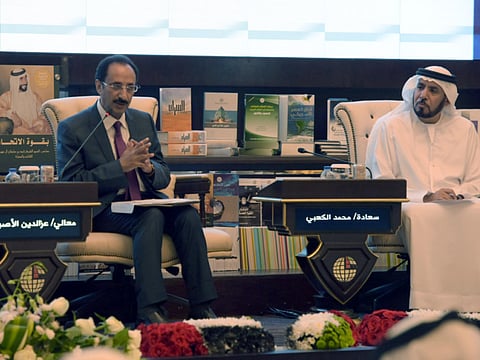‘We have a chance to rebuild a new Yemen’
Yemeni minister says militias are forcing children from schools to the frontlines

Abu Dhabi: Despite the ongoing conflict, Yemen can still move towards a prosperous and democratic future, thanks to the support of the Arab-led coalition, a Yemeni government official has said.
Speaking at a lecture organised by the Emirates Human Rights Association on Saturday, Ezz Al Deen Al Asbahi, Minister of Human Rights in Yemen, discussed the upheavals ordinary Yemeni citizens are going through due to the attacks by Al Houthi militia and fighters allied to former strongman Ali Abdullah Saleh, but said he was hopeful for the country’s future.
“There is a historical opportunity before us to forge a new Yemen, to start a fresh political project based on human rights, equality and stability,” he said.
“The UAE’s efforts in the Arab coalition is a historical moment in the region, it is an Arab initiative that will help bring back legitimacy to Yemen, and will allow us rebuild our country,” he added.
Al Asbahi emphasised that the Arab coalition and their Yemeni partners agree that what is required is not a military victory alone.
“It’s not only about destroying the militias, but reconstructing a society that is based on citizenship and the acceptance of others,” he said. “The UAE is a pioneer when it comes to the development of coexistence, and it will play a big role in helping Yemen achieve this,” he added.
“We cannot allow our martyrs’ sacrifices to be in vain,” Al Asbahi warned.
The minister was critical of the tactics deployed by Al Houthi militia, and attributed that as a leading cause of civilian causalities.
“Several violations have been carried out, including the targeting of schools, hospitals and power stations. There is no clear military objective here other than to hurt the people and to destroy vital infrastructure,” he said.
Al Asbahi also condemned the use of child soldiers by the militias, which he deemed to be one of the many war crimes being carried out.
“There are visits to schools [under militia control] where they go and take the children, sending them to the frontlines,” he said.
“Hundreds of children in Aden and Taiz were recruited, and all of this was clearly documented,” he added.
The militias according to Al Asbahi also turned schools into military barracks and weapons storage facilities.
The planting of landmines is also leading to a large number of civilian casualties. “In October at least 12 children were killed as a result of landmines, and so far more than 145 people have died,” Al Asbahi said.
“The militias are planting mines around the cities and homes which only bring harm, and that is the main intention,” he added.
Kidnappings by the militia are also a major concern, the minister said. “The number of people that have been kidnapped by the militias is 7,347. In the capital Sana’a there have been 1,650 kidnappings, some of which have been carried out against activists and people working in the media.
“There were 187 cases of kidnappings in October, with 12 homes belonging to opposition members being demolished,” Al Asbahi added.
Sign up for the Daily Briefing
Get the latest news and updates straight to your inbox



